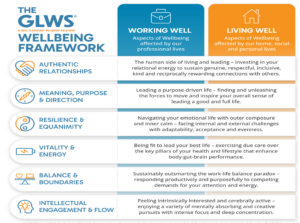
In February 2025, The Times said that the headhunting firm Russell Reynolds Associates had said that 202 CEOs leading companies in 13 of the world’s largest stock markets had stood down in 2024, about 9 per cent more than in 2023.
While it attributed this to a range of factors including increased scrutiny from investors and more regulation, it also said that the pressure of the role and intensive working life were also increasingly to blame.
GLWSWellbeing, which specialises in Wellbeing tools and diagnostics to support executive coaches and employers, says its data shows that only 10% of leaders report themselves as “thriving”, a number which has shrunk from 15% since 2020. They say 40% are “struggling, languishing or unwell” and that “the percentage of leaders who report Very Low work-related wellbeing and are categorised as Unwell has worsened by 33% since 2016.” Of course, this may be because this generation of leaders is more aware of their own wellbeing as well as because it could be worsening. Either way, these figures are stark.
My experience coaching leaders
As someone who coaches senior leaders, C-Suite and Boards, the number of my clients who want to discuss their resilience, stress or wellbeing is certainly increasing. Now, I ask every client I take on a new question in my first session: “how is your own wellbeing?”
Recently, a new client said “Thank you for asking that – one of my goals is to become happier”.
He went on to the describe the pressures of his role as a senior Board Director, the long hours and the effect it had on him and his family.
But most of my clients aren’t looking for sympathy – most find it quite hard to talk about the stress they feel and indeed most have chosen their career and roles because they find the long hours, scrutiny, personal accountability and 24-hour lifestyle stimulating and engaging. As one said to me “I love this role and getting up each day not knowing what new challenges I’ll encounter – it’s very tough but that’s why I love it”.
However, leaders cannot survive in roles in which there are constantly “on” with little recovery time without physical or mental consequences. Some tell me they eat late and take a glass of wine to unwind before bed. Not realising of course that alcohol is a stimulant and their metabolism is still processing their late meal. So, their sleep is unsettled and disturbed and does not provide the deep recovery they need before waking up early to start the next day’s emails.
Sports people talk about the importance of recovery, sleep and diet to their performance – why should leaders be any different?
Most leaders now understand the importance of exercise in their life, often running each day or going to the gym, and they feel energised by this and can ‘switch off’ even for a short time. But most pay little attention to the importance of their diet, sleep, relationships and their focus outside work.
How can coaches and employers help?
GLWSWellbeing says that leadership wellbeing is a factor of “Living Well” and “Working Well” and that coaches and HR professionals can explore and improve in both these dimensions. They say that we build up our personal and physical resources which we then expend in our working and personal lives. However, if in a busy, full-on week we do not replenish our resources and recover then we increasingly struggle with the challenges we face.
While a healthy level of stress and pressure can stimulate peak performance for many leaders, further stress can lead to poor performance, low mood, anxiety and burn-out.
GLWSWellbeing have identified the following areas which coaches can explore with leadership clients.

The higher they go in terms of seniority, the less leaders express their feelings or have someone they can turn to. “My boss is a nice person but is really only interested in the numbers, and I don’t want to take this home to discuss with my partner – they just don’t understand the world I operate in.” said a recent client.
As coaches or HR professionals, I believe we all have a duty to raise the topic of well being with leaders, whether or not they raise it with us. Unless we ask about it, they may never feel able to talk about some of the anxiety or pressure they are facing, inside or outside work.
If you would like to explore this topic further, either with your HR team or in a workshop with your senior or future leaders please contact Gary at [email protected].
Visit his website at www.futureleadership.co.uk
Executive Coach Gary Storer helps his clients refine their skills, thinking and inner resources to equip them not just to deal with present challenges but also anything they encounter in the future.
Read more blogs from Gary – Leading During a Crisis: Leadership Mindsets and Skills

+ 4 more
Masters qualified coach developing leaders, future leaders and senior teams throughout UK